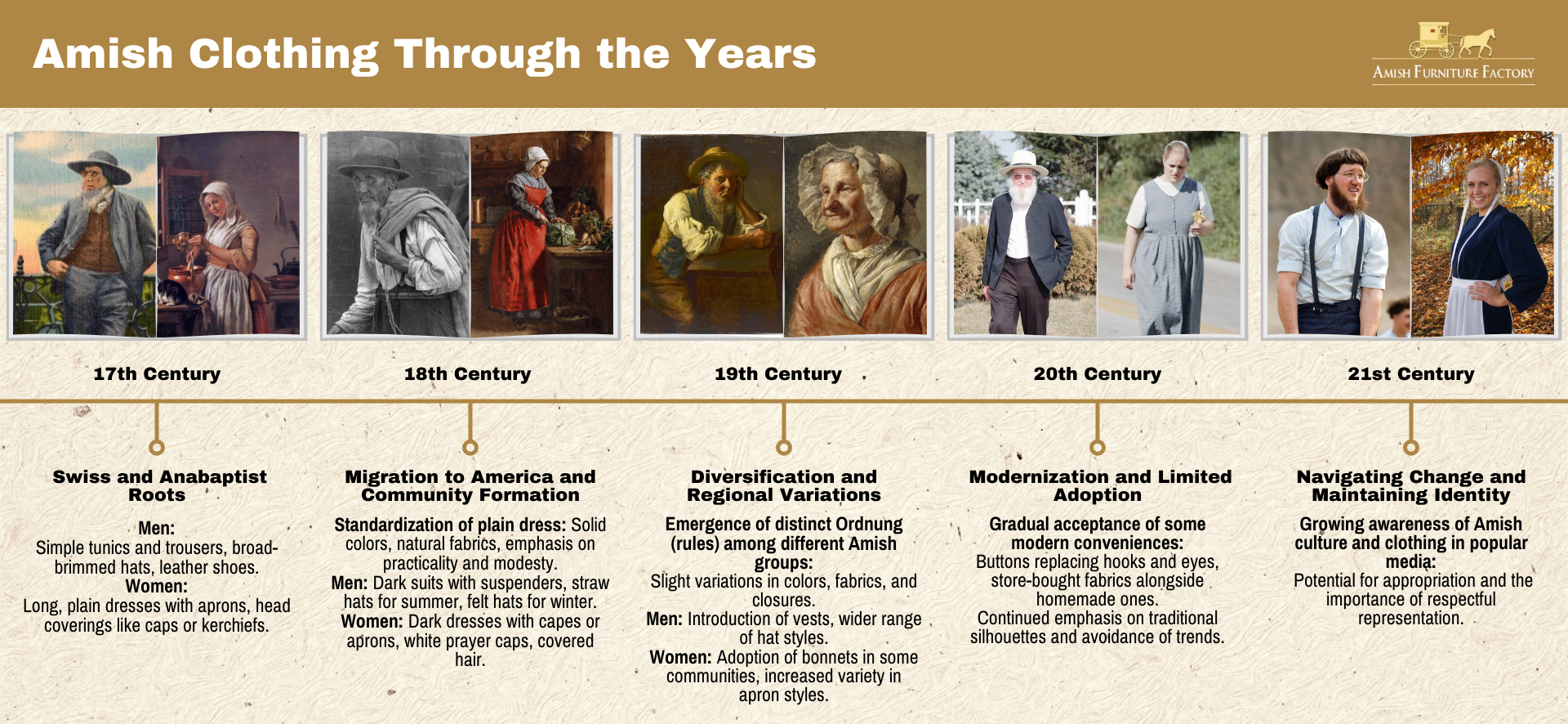
Clothing is already an essential part of our lives since ages ago. What and how we wear says everything about us – our lifestyle, personality, beliefs, and attitude. How about the clothing worn by the “Plain People”? In this article, we’ll take a deep dive into everything about Amish fashion and clothing attire.
Amish clothing emphasizes functionality rather than uniqueness. One can easily distinguish the Amish by their solid-colored garments, fastened shirts with traditional buttons, long sleeves, full skirts, capes, hats, and suspenders. The Amish fashion symbolizes their faith, humility, and separation from the world.
This article aims to help you get a better and deeper understanding of what makes the Amish clothing different and what they really mean.
Early Days of The Amish Clothing
Long ago, Mennonites and Amish were communities consisting primarily of peasants who worked long and hard to provide for the other members of their respective communities. They prioritize family, work, and mutual aid so much that fashion and clothing would be at the bottom of their priority list if there’s any.
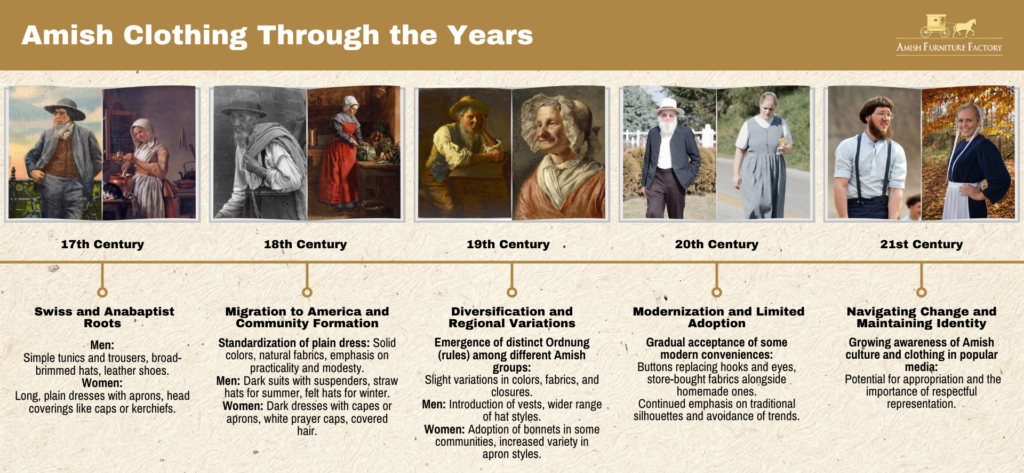
Amish separated from the Mennonites in Europe at the end of the 17th century. They continued sporting the same all-around style of clothing as the typical rural people of the Palatinate, the Alsace, and other European parts where they used to live.
The Amish beliefs dictated their choice to dress much more plainly and conservatively. This is what we know now as the iconic “Amish Clothing”.
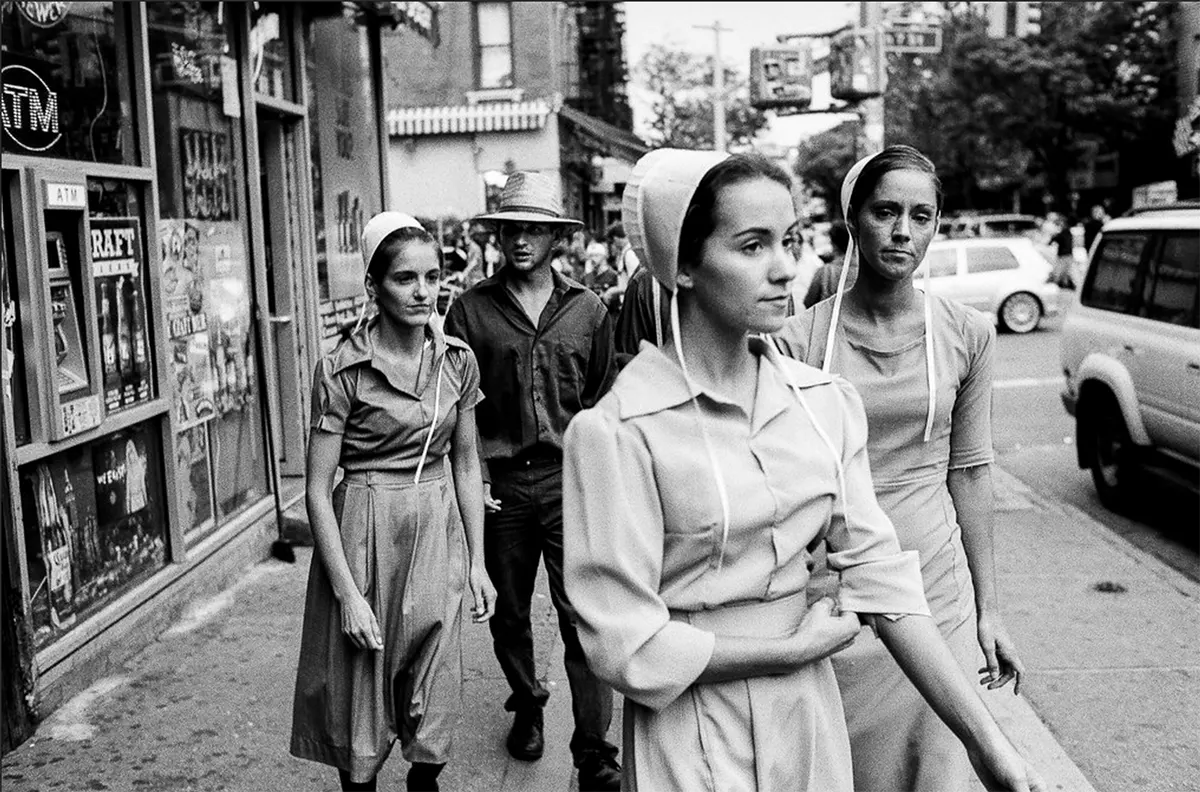
If you look at pictures of some older Amish communities, you’ll see that almost everything has stayed the same in Amish clothing since then; the colors are still somber, no stripes or any design on the fabric, no shoe buckles, no accessories or jewelry, and no ribbons.
If there are any changes, it would be in the type of fabric due to the availability in the market.
What Kind of Clothing Do Amish People Wear?
There wasn’t much of a need for dressing up in formal or fancy clothing, so the Amish typically wore plain clothes, allowing them to perform their jobs in the best manner possible.
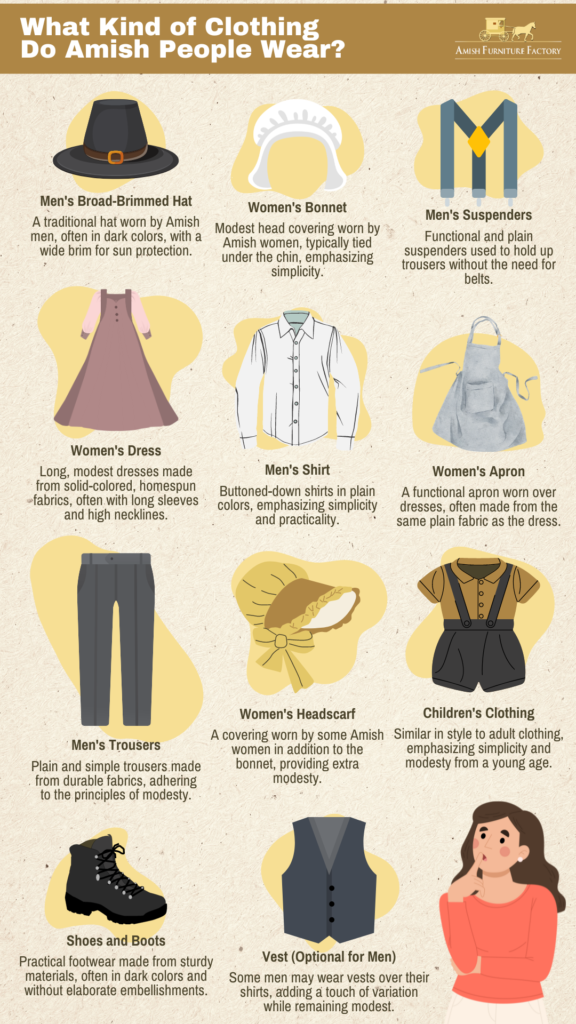
The Amish always wear black and white. There is “black” that has shades of blue, brown, and gray. In the general Amish community, it needs to be the “blackest black” there is. Some settlements, however, allow charcoal grays, burgundies, navy blues, and browns.
The Amish clothing is not tight and revealing. The Amish generally use Triblend denim, made from cotton, polyester, and rayon, as it is highly durable. They never wear anything made of 100% cotton, since it would quickly fade and distort.
The weight of the fabric is an essential factor as well. It should not be too heavy, but not too light. During summer, the Amish women will make dresses made up of broadcloths like men’s shirts, as they are wrinkle-free and lightweight compared to polyesters.
The Amish Garment Choices
The clothing choices of the Amish community are deeply rooted in principles of modesty, simplicity, and tradition. Amish men and women adhere to a distinct style of dress that has remained largely unchanged for centuries. Men typically wear broad-brimmed hats, suspenders, plain shirts, and trousers, while women wear modest dresses with aprons, bonnets, and headscarves.
These garment choices reflect a commitment to humility and a deliberate separation from the fashion trends of the outside world. Each element of Amish attire is carefully chosen to align with their cultural values, fostering a sense of community and shared identity.
Color Symbolism in Amish Clothing
In the world of the Amish, color speaks a language of its own, conveying messages of modesty, humility, and adherence to community norms. Traditional Amish clothing is characterized by a limited color palette, predominantly consisting of dark and solid hues. These choices are intentional, symbolizing simplicity and a rejection of ostentatious displays.
Bright colors and patterns are avoided, as they are perceived as worldly and distracting. Understanding the color symbolism in Amish clothing provides insights into the cultural values and the unwavering commitment to a humble and plain way of life.
Seasonal Variations in Amish Attire
While the core principles of Amish clothing remain constant, there are subtle variations in attire to accommodate seasonal changes.
In colder months, Amish individuals layer their clothing, adding warmth without compromising modesty. Women may wear heavier fabrics and additional layers, while men might opt for insulated outerwear.
During warmer weather, lighter fabrics and breathable designs ensure comfort while maintaining modesty. These seasonal adaptations showcase the practicality inherent in Amish culture, as clothing serves not only as a reflection of religious beliefs but also as a functional and adaptable aspect of daily life.
What Kind of Clothes Do Amish Men Wear?

The Amish men wear mutza suits. They are straight-cut suits and coats without collars, lapels, or pockets, resembling the Nehru jackets of the 70s. The shirts have long sleeves and have no pattern or printing.
The pants that Amish men usually wear are called “Barn door pants.” Unlike the usual pants English men use, barn door pants have no zippers and are folded and buttoned along the top.
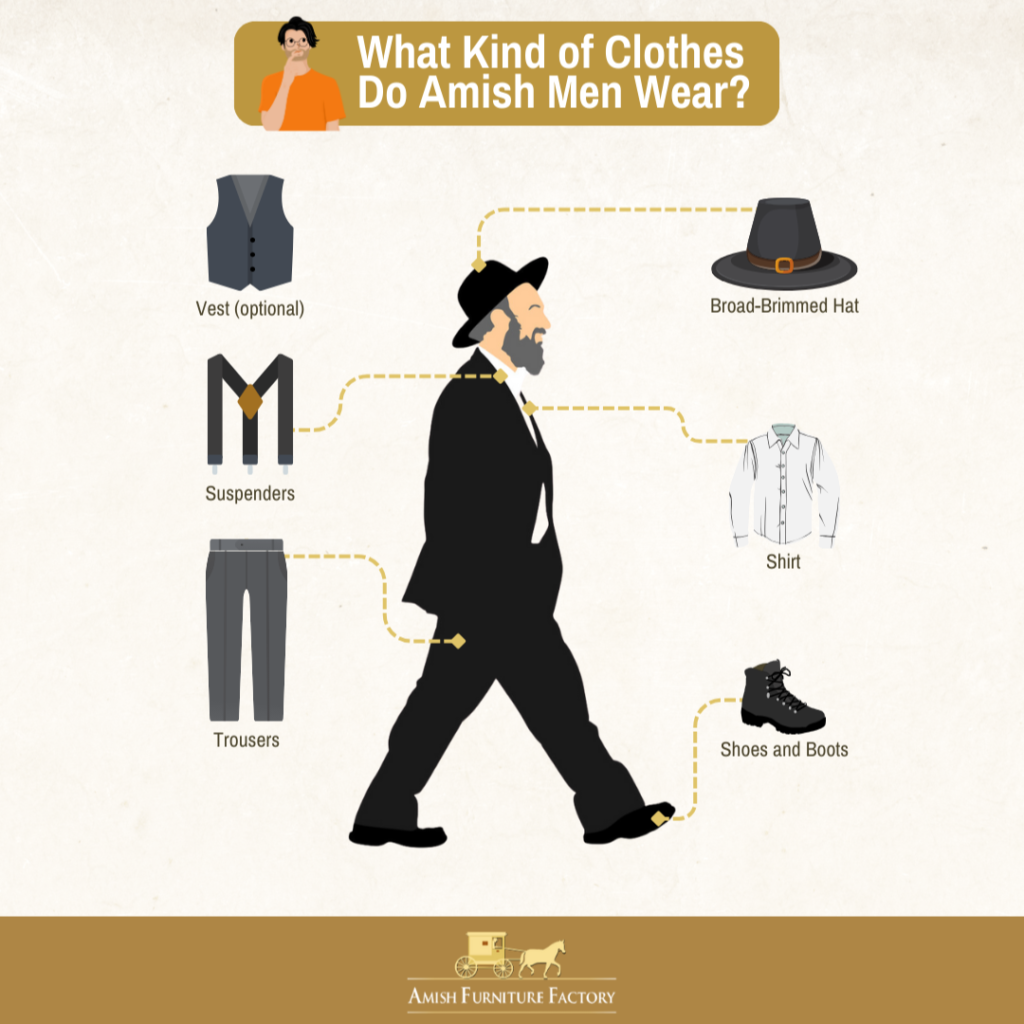
They have no cuffs or creases, no outside pockets, and are worn with suspenders, not belts. For the Amish, belts are considered ostentatious and should never be worn in any way.
During summer, Amish women make shirts made of 65% polyester and 35% cotton, called Dacron Denim for men. These shirts are often in navy blue and gray. Men and boys wear the same fabric, except that the boys’ shirts are typically lighter.
Felt and straw hats are not optional for Amish men. A straw hat is essential to their culture, as they view it as a religious symbol.
What is an Amish Woman’s Dress Called?
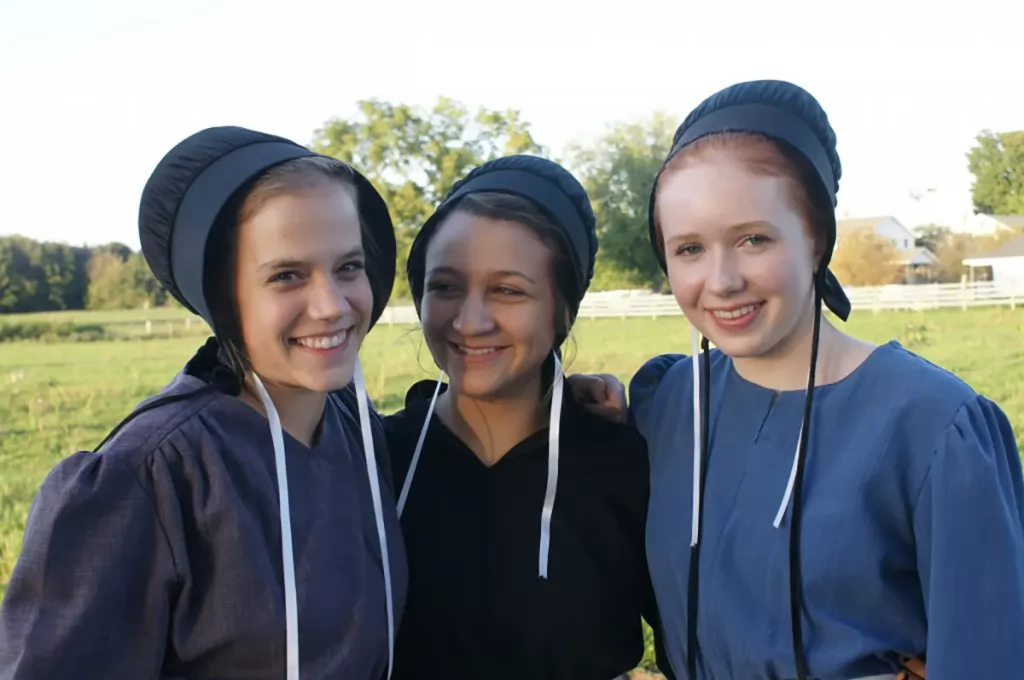
Many Amish women believed they only needed four women’s dresses: One for wear, one for wash, one for spare, and one for dress. However, times have changed, and this may not be the case anymore.
A typical Amish woman usually makes and wears a cape dress, solid-colored long apparel with long or short sleeves, and a full skirt with a double layer on the bodice. This fabric has a square or V-shaped form that conceals the wearer’s body shape.
The length of the Amish dress may vary from knee-length to ankle-length. The sleeves may be longer or shorter, but never sleeveless.
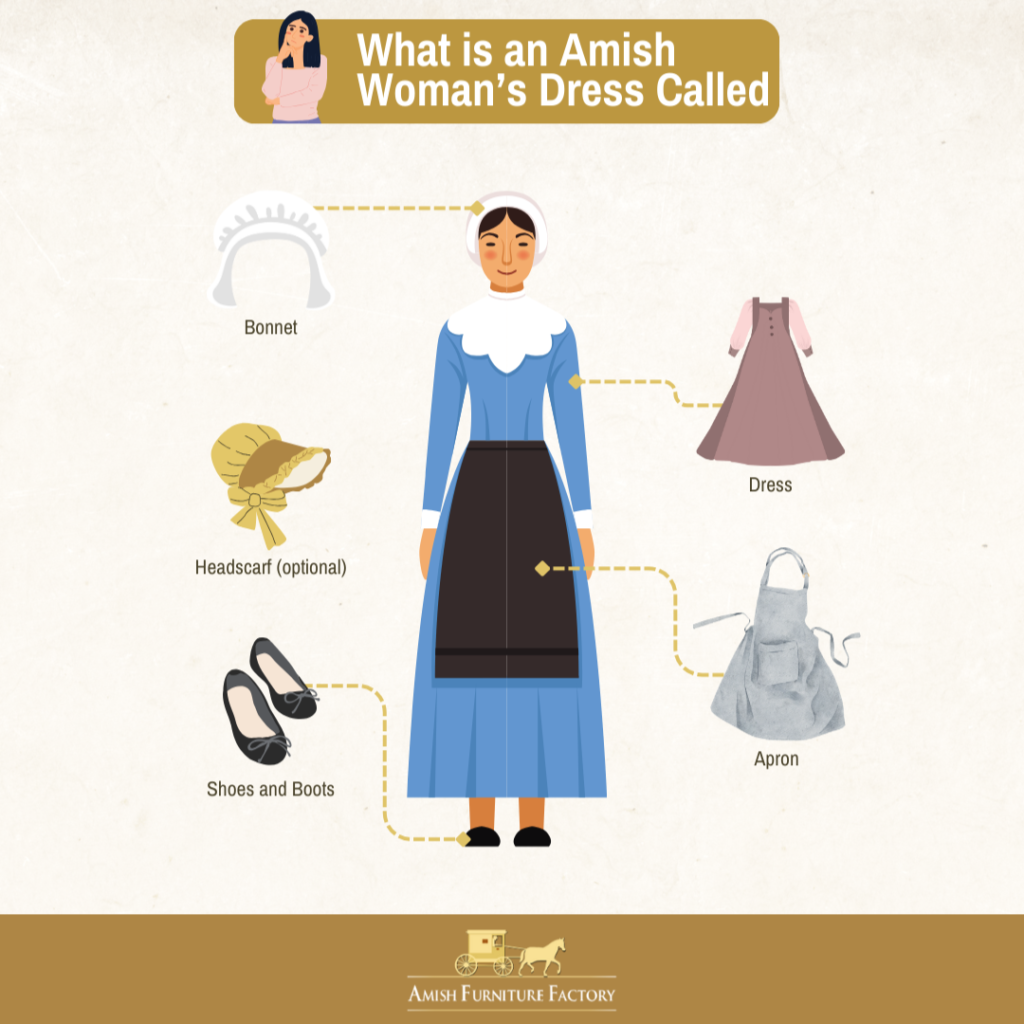
Amish women’s dresses’ colors range from brown and blue to lighter hues, such as pink and turquoise. In case of a relative’s death, an Amish woman will wear a black dress for a specific period. Depending on the Amish settlement’s practices, buttons or straight pins are used to fasten the skirts.
Sunday dresses are different for Amish women and young Amish girls. Singles wear a plain colored dress underneath with a white cape and apron on top, while married women wear the same solid-colored clothing underneath with a black cape and apron.
Black cotton stockings, shoes with low heels, and prayer caps/head coverings (Kapp) are mandatory inside the church.
Amish women wear gray aprons and go barefoot to work around their farms. It is essential for them that the type of fabric they use will not be easily wrinkled while working on the farms or riding their buggies for hours.
Most importantly, Amish women don’t use jewelry or any other embellishments. They never cut their hair, always wearing it in a braid or bun on the back of the head, covered with a small white cap. They would never be seen outside their homes without their knit caps.
The Reason Behind the Amish Clothing
Plain clothing separates the Amish community from the world. They emphasize their clothing as a sign of modesty and separation from the rest.
Most importantly, it’s the Amish way of showing respect for their faith. If there’s one thing we learn about the Amish, they take bible verses literally. They believe that wearing plain clothing is biblically mandated due to the following verses:
“Your beauty should not come from outward adornment, such as elaborate hairstyles and the wearing of gold jewelry or fine clothes. Rather, it should be that of your inner self, the unfading beauty of a gentle and quiet spirit, which is of great worth in God’s sight.” – 1 Peter 3:3-4
“Pray this way for kings and all who are in authority so that we can live peaceful and quiet lives marked by godliness and dignity.” – 1 Timothy 2:2
1. Separation and Submission
Amish clothing serves as a visible expression of the community’s commitment to separation from the secular world and submission to their religious values. The distinctive attire worn by both men and women is a deliberate choice to set themselves apart, fostering a sense of belonging and shared identity within the close-knit Amish society.
Through modest and plain clothing, the Amish convey a message of separation from materialism and a dedication to a life centered around faith, family, and community.
2. Humility and Community
At the core of Amish clothing lies the principle of humility. The plain and simple garments worn by Amish men and women reflect their commitment to living a humble and unpretentious life. This emphasis on humility extends beyond individual attire; it fosters a sense of equality and unity within the community.
Amish clothing choices become a powerful symbol of shared values, reinforcing the importance of community over individualism and reinforcing a collective commitment to a modest way of life.
3. Practicality and Tradition
Practicality and tradition are interwoven in the fabric of Amish clothing. Every garment, from the broad-brimmed hats to the modest dresses, is designed with functionality in mind. The attire reflects the demands of a lifestyle centered around agriculture and manual labor, ensuring durability and ease of movement.
Additionally, these clothing choices are deeply rooted in tradition, passed down through generations, creating a visual continuity that reinforces the enduring values of the Amish way of life.
4. Sustainability
Amish clothing embodies a sustainable approach to fashion. Crafted from simple, often locally sourced materials, and designed for durability, the garments reflect an eco-conscious mindset. The avoidance of fast fashion trends and the reliance on handmade, homemade items contribute to a sustainable lifestyle that aligns with the Amish commitment to stewardship of the earth.
In a world of constant change, Amish clothing remains a testament to the enduring values of simplicity, sustainability, and a harmonious relationship with nature.
How Do Amish Wear Their Hair?
Amish women keep the hair they’re born with. They believe that the longer the hair, the more beautiful they will be in God’s eyes. In a typical Amish community, women with waist-length hair or longer are not unusual. As a result, chopping or hair trimming in Amish women is not tolerated.
Since electricity and modern products are not part of the Amish lives, they never use hair products, curling or straightening irons, blow-dryers, or commercial hair dyes. For them, using any product to alter the hair’s natural appearance would be considered as violating God’s commandments.

Outside their homes, an Amish woman’s braided or bunned hair is usually covered with “kapp”. The wearing of this prayer covering is to express respect and communicate their status.
Unlike women, Amish men’s hair can be trimmed or cut short. The reason behind the difference is that an Amish man’s hair is considered a reflection of his duty and responsibility to God.
In addition, Amish men have more physical and heavier roles in the Amish community. Short hair makes it more manageable for them to do their tasks without distractions.
Lastly, Amish men also wear hats as a part of their religious practice and as a daily protection against the sun.
When talking about Amish men’s facial hair – all Amish married men should grow a beard. No mustaches are allowed for all Amish men and boys, married and single. The reason goes back hundreds of years ago, when they started to separate and disassociate themselves from those who waged war.
You might be interested in exploring if Amish people use mirrors.
Conclusion
Holding on to something meaningful in a world full of changes can be more challenging than anyone can imagine. Amish clothing, however, is one of the most iconic elements of Amish culture that has survived the test of time.
It is also one of the most outstanding examples of how the Amish people have worked hard to preserve what they believe in since their birth in the 16th to 17th centuries.
An average English household spends $1,500 or more on garments every year. The usual preference is what’s hot, what’s trending, and what’s on sale.
On the other hand, the Amish people ever since make and wear their typically black and plain broadfall trousers, long dresses, suits, suspenders, prayer coverings, and even straw hats. The most joyous pride and strongest religious beliefs that no one can ever take away.
